De Nigeriaanse dichter, schrijver en voorvechter van democratie Akinwande Oluwole “Wole” Soyinka werd geboren op 13 juli 1934 in Abeokuta. Zie ook alle tags voor Wole Soyinka op dit blog.
Uit: Aké. The Years of Childhood
“For a long time it all went without mishap. Then Osiki got carried away. He was a bigger boy than I, so that I had to exert a lot of energy to raise him up, lifting myself on both hands and landing with all possible weight on my seat. Suddenly, while he was up in his turn, it entered his head to do the same. The result was that I was catapulted up very sharply while he landed with such force that the leg of the bench broke on his side. I was flung in the air, sailed over his head and saw, for one long moment, the Canon’s square residence rushing out to meet me.
It was only after I had landed that I took much notice of what I had worn to the party. It was a yellow silk dansiki, and I now saw with some surprise that it had turned a bright crimson, though not yet entirely. But the remaining yellow was rapidly taking on the new colour. My hair on the left side was matted with blood and dirt and, just before the afternoon was shut out and I fell asleep, I wondered if it was going to be possible to squeeze the blood out of the dansiki and pump it back through the gash which I had located beneath my hair.
The house was still and quiet when I woke up. One moment there had been the noise, the shouts and laughter and the bumpy ride of the see-saw, now silence and semi-darkness and the familiar walls of mother’s bedroom. Despite mishaps, I reflected that there was something to be said for birthdays and began to look forward to mine. My only worry now was whether I would have recovered sufficiently to go to school and invite all my friends. Sending Tinu seemed a risky business, she might choose to invite all her friends and pack my birthday with girls I hardly even knew or played with. Then there was another worry. I had noticed that some of the pupils had been kept back in my earlier class and were still going through the same lessons as we had all learnt during my first year in school. I developed a fear that if I remained too long at home, I would also be sent back to join them. When I thought again of all the blood I had lost, it seemed to me that I might actually be bed-ridden for the rest of the year. Everything depended on whether or not the blood on my dansiki had been saved up and restored to my head. I raised it now and turned towards the mirror; it was difficult to tell because of the heavy bandage but, I felt quite certain that my head had not shrunk to any alarming degree.”
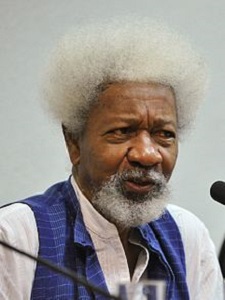
Wole Soyinka (Abeokuta, 13 juli 1934)
De Russische schrijver Isaak Emmanuïlovitsj Babel werd geboren in Odessa op 13 juli 1894. Zie ook alle tags voor Isaak Babel op dit blog.
Uit:De geschiedenis van mijn duiventil (Vertaald door Froukje Slofstra)
“Die Karavajev was een blozende, verbolgen man, die in Moskou had gestudeerd. Hij was amper dertig. Zijn mannelijke wangen hadden een blos als die van boerenkinderen, op zijn ene wang zat een wrat waaruit een plukje asgrauw kattenhaar groeide. Behalve Karavajev was ook de conrector Pjatnitski, die op het gymnasium en in het hele gouvernement gold als een belangrijk man, aanwezig bij het examen. De conrector ondervroeg me over Peter de Grote, waarbij ik een gevoel van wezenloosheid kreeg, van de nabijheid van het einde en de afgrond, een dorre afgrond, bekleed met wanhoop en vervoering.
Over Peter de Grote kende ik de passages uit Poetsykovitsj en de gedichten van Poesjkin vanbuiten. Ik zei die gedichten met snikkende uithalen op, plotseling trokken er menselijke gezichten voor mijn ogen langs en raakten daar vermengd als kaarten uit een nieuw spel. Ze werden op de bodem van mijn ogen geschud, en ondertussen richtte ik me op en schreeuwde bevend, gejaagd, uit volle borst Poesjkins strofen uit. Ik stond lang te schreeuwen, niemand onderbrak mijn krankzinnige gestamel. Door mijn vuurrode verblinding, door mijn roes van vrijheid, zag ik alleen het oude, voorovergebogen gezicht van Pjatnitski met zijn zilverkleurige baard. Hij onderbrak me niet, maar richtte zich tot Karavajev, die ingenomen was met mij en met Poesjkin: ‘Wat een volk,’ fluisterde de oude man, ‘in die joden van jullie huist de duivel.’
En toen ik zweeg, zei hij: ‘Goed, mijn jongen, je kunt gaan…’
Ik liep de klas uit en de gang op, en daar, leunend tegen de ongewitte muur, kwam ik bij uit de stuiptrekkingen van mijn droom. Om me heen speelden Russische jongens; vlakbij, in het institutioneel ogende trappenhuis, hing de schoolbel, een toezichthouder zat te soezen op een doorgezakte stoel. Ik keek naar hem en kwam weer bij zinnen. Van alle kanten slopen er kinderen op me af. Ze wilden me een tik geven of gewoon spelen, maar opeens verscheen Pjatnitski in de gang. Toen hij langs me liep, bleef hij even staan, zijn geklede jas golfde traag en zwaar over zijn rug. Ik zag de verwarring in die brede, vlezige herenrug, en schoof in de richting van de oude man.
‘Kinderen,’ zei hij tegen de leerlingen, ‘laat deze jongen met rust’, en hij legde een vette, weke hand op mijn schouder. ‘Mijn jongen,’ wendde Pjatnitski zich toen tot mij, ‘zeg tegen je vader dat je bent toegelaten tot de eerste klas.’
Op zijn borst blonk een prachtige ster, aan zijn revers rinkelden medailles, zijn grote zwarte geüniformeerde lichaam liep op stramme benen weg. Ingeklemd tussen de sombere muren bewoog het zich als een binnenschip door een diep kanaal en verdween door de deuren van de directeurskamer. Een kleine bediende bracht hem met veel ceremonieel zijn thee, en ik rende naar huis, naar de winkel.”
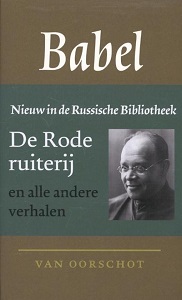
Isaak Babel (13 juli 1894 – 27 januari 1940)
Cover
De Canadese schrijver Scott Symons werd geboren op 13 juli 1933 in Toronto. Zie ook alle tags voor Scott Symons op dit blog.
Uit: Place d’Armes
„The low organic bas-relief of the Providence Building dallied him, as he scaled the careful crags to the top, like some wellbred mountain goat. And then skyhopping … passed to the well-fed balustrading atop the brownstone stack beside … balustrades that distended in prime sirloin…. He pocketed the ironwork of the clock, particularly the hour-hands … and then he was interrogating again the crest pedimenting the Mother Bank of All Montreal: merchantman’s Parthenon frieze … whereon the heroes were sailor and yeoman-worker, and Indian: it was a quotation from the Amurrican world of Currier and Ives — with this difference — it was in stone! It was in 3-D … Currier and Ives for Cubes. And so aptly, atop the crest of Montreal itself … the beaver — the Complete Canadian Cube … the symbol of the state — substantial, diligent, sure, sombre, comestible (but only by the tail) … and, of course, it could be fleeced — the Canadian Golden Fleece. he was sucked over to the Bank … and in, and endlessly voyeur mounted to say goodbye to the castors within … to his legal guinea pigs: and as he expected, they had that look of men about to lose their maidenheads … in fact of men who had lost their maidenheads, but didn’t quite know how or why…. Somewhere they had been had.By him. But if they acknowledged it then they were lost to respectability — and they clung to that matriarch with all the diligent will of the foredoomed. crossed La Place … into the garden of the Church … the snow kindly absolved the dirt of it — the evident sterility of its soil. Covered it and gave it back its beauty … flowered the rows of chestnut trees that flanked it … in the centre, a saint or other, wintered under a contraceptual bag.Some day this garden would flower again, would welcome the public again … but only when the people wanted gardens again —perhaps the city would make it a tourist attraction for the Centennial Exposition —it was excuse sufficient. Meanwhile it remained a medieval close, curious analogue of the Place itself. He made his way to the flank of the Church … up a back alley — the tower strode over him … and seen from these abutments, it was immensely convincing — no mere Gothic revival facade … and doubly so in that through the portcullised gate beside he could see the Mother Bank brooding over the Place: it was an unexpected dividend — and it sufficed him … He turned up the front steps of the Church … past the huge cast-iron lamps in front, through the central of the three arches, into the Church … he intended to visit the Church Museum — to see Jean Le Ber’s frontal — but he stopped abruptly … in a pew at the back of the Church. »
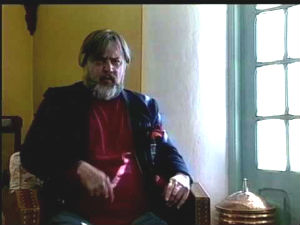
Scott Symons (13 juli 1933 – 23 februari 2009)
De Duitse schrijfster Rebecca Salentin werd geboren op 13 juli 1979 in Eschweiler. Zie ook alle tags voor Rebecca Salentin op dit blog.
Uit: Hintergrundwissen eines Klavierstimmers
“Der Klavierstimmer war kopfschüttelnd und mit zittrigen Beinen die ul. Stradomska hochgegangen. Oft hatte er anhalten und sich die Stirn mit dem Taschentuch abwischen müssen, dabei die Tüte mit dem Gebäck in der Hand mit dem Stock haltend. Zu guter Letzt war ihm dann noch der schwerliche Gang hinauf zu Karols Wohnung geblieben.
Erst hatten sie schweigend gesessen, Tee getrunken und das mitgebrachte Gebäck gegessen. Dann hatte der Klavierstimmer ein wenig vom Schtetl erzählt, vom Rabbiner Jehoschua Thon, der ihm gefiel, weil seine Ansichten fortschrittlich waren, weil er unter den Krakauer Zionisten herausragte. Kazimierz hatte nach seiner Flucht aus Georgien erst in Lemberg gelebt. Er berichtete Karol, dass er den Rabbiner dort schon als kleinen Jungen kennen gelernt hatte, bevor Jehoschua nach Berlin gegangen war, um dort an der Universität den Doktor der Theologie und Philosophie zu machen. Dass er Jehoschua Thon in Krakau wiedergetroffen hatte, als dieser dort vor zehn Jahren Rabbi der Tempelsynagoge geworden war. Und dass der Rabbi Thon nur drei Jahre nach seiner Amtseinführung die jüdische Bibliothek Ezra an der ul. Krakowska mitgegründet habe. Er erzählte von den Gelehrten und Künstlern, oft konfessionslose Juden wie er selbst, die seine Freunde waren. Davon, dass Josef Sare als jüdischer Vertreter nicht nur in den Stadtrat gewählt worden sei, sondern sogar zum Vizepräsidenten von Krakau.
Normalerweise erzählte er auch ein wenig vom dwór, belangloses meist, nichts von dem Gestank der Katzen, nichts vom Drozdowski, nichts vom Verfall.
Einmal im Jahr stimmte er Karols Klavier, auf dem nie gespielt wurde.
An diesem Donnerstag aber hatte er, nachdem er vom Rabbi Thon und Josef Sare gesprochen hatte, Karol von den Hochzeitsplänen zwischen den Häusern Laub und Kożny berichtet. Stockend hatte er das wiedergegeben, was er mitbekommen hatte, als er dort am Tag zuvor den Bösendorfer gestimmt hatte. Davon, dass er dies eigentlich schon tags zuvor hatte tun wollen, nachdem er bei Elżbieta den Drozdowski gestimmt hatte. Dass ihn dann aber eine derartige Übelkeit erfasst habe, dass er die Kożnyschen Ländereien erst besudelt und dann verlassen habe, ohne seinen Auftrag erfüllt zu haben. Also sei er am nächsten Tag den weiten Weg noch einmal gegangen, und während er am Bösendorfer gearbeitet habe, sei Elżbieta aufgetaucht.
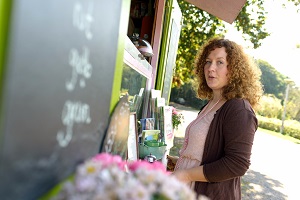
Rebecca Salentin (Eschweiler, 13 juli 1979)
De Congolese dichter, schrijver en journalist Antoine-Roger Bolamba werd geboren in Boma in de provincie Bas-Congo (tegenwoordig Congo Central) op 13 juli 1913. Zie ook alle tags voorAntoine-Roger Bolamba op dit blog.
Bamboula
An eagle of steel has broken forgetfulness.
My apocalyptic words
have a sugary smile.
My sandy exploits
mock incendiary ideas.
My elephant-hide courage
challenges fraud.
Meaning disappears in a pool –
the sweat of grief weeps for it.
The shades of the dead
crackle like flames.
The lost have only their idols left,
who open wide their huge marble eyes.
Redemption has broken its oath.
Between hell’s knees
the sword of sin
blazes with rage.
Seductions with shining loincloths
are the prey of idleness.
The gauze-winged wind whistles.
before my ear’s window.
The villages advance
with quickened steps
to save the world’s treasures
from disaster.
The spirit sticks
to the narrow limits of reality.
The raised dagger
stolen from sowers of good words
slowly enters the brain of space –
the sowers who
L
A
U
G
H
at us.
The towns drag their sandals
and carry the weight
of hunger in their bellies.
Here is the essence
passing by way of fantasy
at the hour of dusk
in the countryside,
where parrots jabber,
messengers of the baobab’s strength.
Give me solar muscles,
thighs of forest,
a stinging kiss of pepper,
the fleshy lips of sleep.
Give me the damp air of butterflies,
desire’s frenetic belly,
the fragrance of memory,
the rainy season’s cool.
Bamboula –
the rat grapples with the bark of night.
Bamboula –
the oarsman-bird
who spits phenomena –
bamboula bamboula –
the sorcerer-man
who hunts the scent of flesh –
bamboula oho! bamboula –
the landscape
that has fallen apart by chance
has only one way out:
saving its skin.
Vertaald door Yvonne Reddick
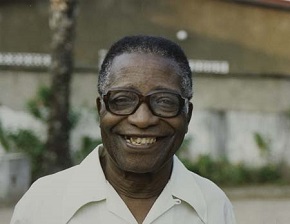
Antoine-Roger Bolamba (13 juli 1913 – 2 juli 2002)
Zie voor nog meer schrijvers van de 13e juli ook mijn blog van 13 juli 2016 en ook mijn blog van 13 juli 2014 deel 2 en ook deel 3.
